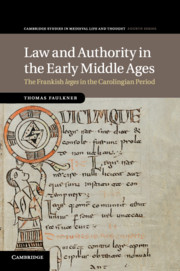Book contents
- Frontmatter
- Contents
- List of illustrations
- List of tables
- Abbreviations
- INTRODUCTION
- 1 THE MINOR leges PART I. PROBLEMS, BACKGROUND, Lex Ribuaria, Ewa ad Amorem
- 2 THE MINOR leges 2. SAXONY AND THE Lex Saxonum
- 3 THE ADDITIONAL CAPITULARIES
- 4 THE READING OF NORMATIVE TEXTS: BENEDICTUS LEVITA AND REGINO
- 5 THE MANUSCRIPTS OF THE leges-SCRIPTORIUM
- CONCLUSION
- Editions
- Bibliography
- General index
- Index of legal texts
- Index of manuscripts
- Frontmatter
- Contents
- List of illustrations
- List of tables
- Abbreviations
- INTRODUCTION
- 1 THE MINOR leges PART I. PROBLEMS, BACKGROUND, Lex Ribuaria, Ewa ad Amorem
- 2 THE MINOR leges 2. SAXONY AND THE Lex Saxonum
- 3 THE ADDITIONAL CAPITULARIES
- 4 THE READING OF NORMATIVE TEXTS: BENEDICTUS LEVITA AND REGINO
- 5 THE MANUSCRIPTS OF THE leges-SCRIPTORIUM
- CONCLUSION
- Editions
- Bibliography
- General index
- Index of legal texts
- Index of manuscripts
Summary
The leges barbarorum are among the richest of all sources for early medieval history. They potentially tell us about how disputes were settled, the forms of political authority, the extent and nature of literacy, the construction of ethnic communities and self-perception, economic and social organisation, the relationship between spoken and written language, and religious practice; in short, almost every subject of interest to historians. But tapping any of this potential has always proved very difficult indeed.
The texts were problematic first of all for generations of German scholars, from the very beginnings of professional history, often referred to as members of the Historische Rechtsschule. The approach underlying this German work was that, if the basic history of the composition of the laws could be established, and if an accurate Urtext of each could be produced, then the evolution of Germanic law could be traced, common principles deduced, and their rich evidence on social and political structures deployed in their proper context. The historians therefore concentrated on establishing where and when the leges were produced, using which sources, whether they came together in layers over centuries, or were codified all at once, and so on. They then tried to deduce elements of a system from the diverse codes, and to place each one of them on a family tree of Germanic law, in much the same way as contemporary scholars of linguistics approached Germanic and other Indo-European languages. But the raw difficulty of the texts and their manuscript traditions meant that the levels of consensus ever achieved on the very basics of the history of the texts were various.
Since the later twentieth century, problems with the leges have been revealed also on a rather different level: the nature of the prescriptive legal texts’ relationship with practice. It has been stressed that, even if one can date and locate them, one cannot read prescriptive texts at face value, as straightforward guides to practice in courts, or as direct evidence for social structure. This is true throughout the early middle ages, but especially so in the Carolingian period, in which texts of lex centuries old continued to be copied.
- Type
- Chapter
- Information
- Law and Authority in the Early Middle AgesThe Frankish leges in the Carolingian Period, pp. 1 - 8Publisher: Cambridge University PressPrint publication year: 2016

